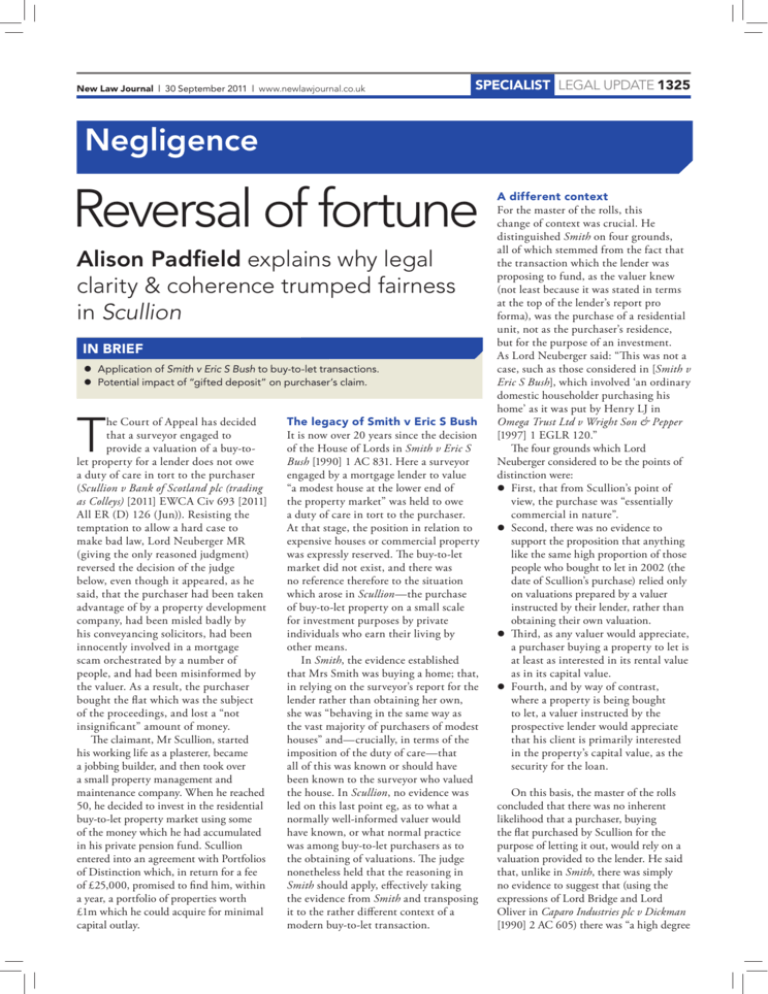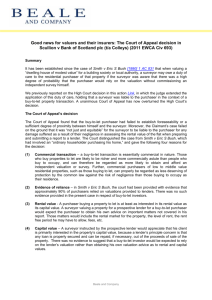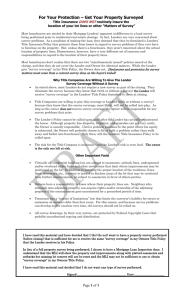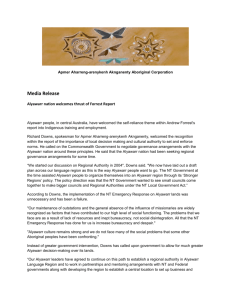Reversal of fortune
advertisement

New Law Journal | 30 September 2011 | www.newlawjournal.co.uk SPECIALIST LEGAL UPDATE 1325 Negligence Reversal of fortune Alison Padfield explains why legal clarity & coherence trumped fairness in Scullion In Brief zzApplication of Smith v Eric S Bush to buy-to-let transactions. zzPotential impact of “gifted deposit” on purchaser’s claim. T he Court of Appeal has decided that a surveyor engaged to provide a valuation of a buy-tolet property for a lender does not owe a duty of care in tort to the purchaser (Scullion v Bank of Scotland plc (trading as Colleys) [2011] EWCA Civ 693 [2011] All ER (D) 126 (Jun)). Resisting the temptation to allow a hard case to make bad law, Lord Neuberger MR (giving the only reasoned judgment) reversed the decision of the judge below, even though it appeared, as he said, that the purchaser had been taken advantage of by a property development company, had been misled badly by his conveyancing solicitors, had been innocently involved in a mortgage scam orchestrated by a number of people, and had been misinformed by the valuer. As a result, the purchaser bought the flat which was the subject of the proceedings, and lost a “not insignificant” amount of money. The claimant, Mr Scullion, started his working life as a plasterer, became a jobbing builder, and then took over a small property management and maintenance company. When he reached 50, he decided to invest in the residential buy-to-let property market using some of the money which he had accumulated in his private pension fund. Scullion entered into an agreement with Portfolios of Distinction which, in return for a fee of £25,000, promised to find him, within a year, a portfolio of properties worth £1m which he could acquire for minimal capital outlay. The legacy of Smith v Eric S Bush It is now over 20 years since the decision of the House of Lords in Smith v Eric S Bush [1990] 1 AC 831. Here a surveyor engaged by a mortgage lender to value “a modest house at the lower end of the property market” was held to owe a duty of care in tort to the purchaser. At that stage, the position in relation to expensive houses or commercial property was expressly reserved. The buy-to-let market did not exist, and there was no reference therefore to the situation which arose in Scullion—the purchase of buy-to-let property on a small scale for investment purposes by private individuals who earn their living by other means. In Smith, the evidence established that Mrs Smith was buying a home; that, in relying on the surveyor’s report for the lender rather than obtaining her own, she was “behaving in the same way as the vast majority of purchasers of modest houses” and—crucially, in terms of the imposition of the duty of care—that all of this was known or should have been known to the surveyor who valued the house. In Scullion, no evidence was led on this last point eg, as to what a normally well-informed valuer would have known, or what normal practice was among buy-to-let purchasers as to the obtaining of valuations. The judge nonetheless held that the reasoning in Smith should apply, effectively taking the evidence from Smith and transposing it to the rather different context of a modern buy-to-let transaction. A different context For the master of the rolls, this change of context was crucial. He distinguished Smith on four grounds, all of which stemmed from the fact that the transaction which the lender was proposing to fund, as the valuer knew (not least because it was stated in terms at the top of the lender’s report pro forma), was the purchase of a residential unit, not as the purchaser’s residence, but for the purpose of an investment. As Lord Neuberger said: “This was not a case, such as those considered in [Smith v Eric S Bush], which involved ‘an ordinary domestic householder purchasing his home’ as it was put by Henry LJ in Omega Trust Ltd v Wright Son & Pepper [1997] 1 EGLR 120.” The four grounds which Lord Neuberger considered to be the points of distinction were: zzFirst, that from Scullion’s point of view, the purchase was “essentially commercial in nature”. zzSecond, there was no evidence to support the proposition that anything like the same high proportion of those people who bought to let in 2002 (the date of Scullion’s purchase) relied only on valuations prepared by a valuer instructed by their lender, rather than obtaining their own valuation. zzThird, as any valuer would appreciate, a purchaser buying a property to let is at least as interested in its rental value as in its capital value. zzFourth, and by way of contrast, where a property is being bought to let, a valuer instructed by the prospective lender would appreciate that his client is primarily interested in the property’s capital value, as the security for the loan. On this basis, the master of the rolls concluded that there was no inherent likelihood that a purchaser, buying the flat purchased by Scullion for the purpose of letting it out, would rely on a valuation provided to the lender. He said that, unlike in Smith, there was simply no evidence to suggest that (using the expressions of Lord Bridge and Lord Oliver in Caparo Industries plc v Dickman [1990] 2 AC 605) there was “a high degree 1326 LEGAL UPDATE SPECIALIST of probability”, let alone that there was an “overwhelming probability”, or that it was “very likely” or “almost certain” that a purchaser such as Scullion would be expected to rely on the lender’s valuation, rather than obtaining his own valuation advice on the rental and capital values of the flat. Several other potential points of distinction were argued but rejected. These included the low fee (£35) paid by the lender for the valuation in Scullion. This was held not to be significant because the fee, whatever its level, was the sum which the valuer was prepared to accept for proving the report. Similarly, although inclined to accept that the flat purchased by Scullion was a more valuable property than those considered in Smith, Lord Neuberger was not persuaded that the difference was of great magnitude, and therefore of any real relevance. “Gifted deposits” In June 2011, the Financial Services Authority (FSA) published a report entitled Mortgage fraud against lenders. It noted that, in the years leading up to www.newlawjournal.co.uk | 30 September 2011 | New Law Journal 2007, some lenders suffered substantial losses as a result of mortgages being secured under false pretences, with Bradford & Bingley plc and the Chelsea Building Society being two prominent victims. Interestingly, the FSA also said that mortgage fraud has remained “a resilient phenomenon” despite falls in lending following the financial crisis. Against this background, although the first instance judgment was overturned on the issue of duty of care, it remains of interest because of the judge’s obiter ruling (which was not appealed) on the legal impact of a so-called “gifted deposit”. In the Scullion case, the contract of sale provided for a “gifted deposit” of 15% of the purchase price. As the master of the rolls said: “This mysterious provision betrays the fact that the transaction appears to have been part of a regrettably familiar form of mortgage fraud.” This type of mortgage fraud essentially involves a representation to the lender that the purchase price is higher than it really is. This results in the lender unwittingly making a loan at a higher loan to value (LTV) ratio than it otherwise would —sometimes more than 100% of the purchase price—while the purchaser is able to finance the purchase without any capital contribution. In the Scullion case, the “ostensible purchase price” was £352,950, but the total consideration paid for the flat was “in reality” £300,007. The judge at first instance said that Scullion’s application to the lender was inextricably linked to his claim against the surveyor, and although he acquitted him of involvement in any wrongdoing, he said that if he had found that Scullion had deliberately misled the lender into making the loan by fraudulently overstating the purchase price, the principle of ex turpi causa (that no court will lend its aid to someone who founds an action on an immoral or illegal act) would have debarred him from pursuing his claim against the surveyor. The same reasoning would apply to a claim against a solicitor involved in a buy-to-let NLJ transaction. Alison Padfield, barrister, Devereux Chambers. E-mail: padfield@devchambers. co.uk Website: www.devereuxchambers.co.uk Twitter: @alisonpadfield










